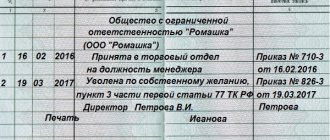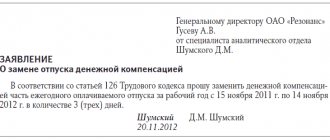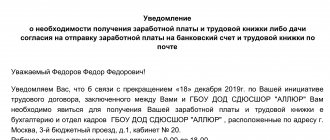| Issues of terminating an employment contract with a part-time worker usually do not cause controversy if the employment relationship is terminated on general grounds. But if a part-time worker is fired due to the hiring of an employee for whom this work will become the main one (Article 288 of the Labor Code of the Russian Federation), the emergence of a labor dispute is almost inevitable. In the article, using examples of court decisions, we will show what violations are committed by employers when dismissing a part-time worker on this basis. | Related articles: —Civil contract or employment contract—Illegally dismissed employee—Fixed-term employment contract —Individual labor dispute |
Dismissal of a part-time worker.
Termination of an employment contract with a part-time worker in the event of hiring an employee.
The dismissal of a part-time worker in the event of hiring an employee for whom this work will be the main one occurs as follows: the employer warns the dismissed person in writing at least two weeks before the termination of the employment contract.
Let us consider the court decision from a generalization of the practice of considering civil cases arising from labor relations for 2009 of the Kaa-Khemsky District Court of the Republic of Tyva.
K. filed a lawsuit against MDOU “Kindergarten No. 5 “Rodnichok” for reinstatement at work, recovery of wages for the period of forced absence and compensation for moral damage, indicating that since 09/01/2008 she worked as a part-time music director in the kindergarten. By order of September 1, 2009, she was dismissed as a temporary employee; she considers the dismissal illegal.
When considering the case, the court found that the plaintiff, having a permanent job as a teacher at the Children's Art School, was hired part-time at the Rodnichok kindergarten as a music director at 0.5 rates, allocated from the rate of the main employee B., at indefinite term.
Later, B. approached the head of the kindergarten with a request to grant her again 0.5 times the salary of a music director, since she has two minor children and is a widow. In connection with the satisfaction of her request, K. was dismissed as a temporary employee.
In accordance with Art. 288 of the Labor Code of the Russian Federation, in addition to the grounds provided for by the Labor Code of the Russian Federation and other federal laws, an employment contract concluded for an indefinite period with a person working part-time may be terminated in the event of hiring an employee for whom this work will be the main one, about which the employer in writing form warns the specified person at least two weeks before termination of the employment contract.
Since the main employee was already working, but a part-time worker was hired at his 0.5 rate for an indefinite period, the employer was still obliged to warn him at least two weeks before terminating the employment contract.
The court found that K. was not notified in writing about the upcoming dismissal. Under such circumstances, the dismissal was illegal, since the employer violated the procedure provided for in Art. 288 Labor Code of the Russian Federation. By a court decision, plaintiff K. was reinstated at work, wages for the period of forced absence and compensation for moral damage in the amount of 2,000 rubles were collected from the defendant.
Dismissal of a part-time worker under Art. 288 of the Labor Code of the Russian Federation is dismissal at the initiative of the employer.
The Arkhangelsk Regional Court considered case No. 44-G-385 on Sh.’s complaint against earlier court decisions to reinstate her at work.
Sh. worked as a urologist in a hospital (hereinafter referred to as the MUZ) part-time at 0.5 times the salary. Subsequently, she was fired due to the hiring of another employee, for whom this work was the main one (Article 288 of the Labor Code of the Russian Federation).
Not agreeing with the part-time dismissal, Sh. filed a claim with the Oktyabrsky District Court of Arkhangelsk for reinstatement at work, changing the wording of the legal regime of the work performed, recovery of maternity benefits, and recovery of monetary compensation for moral damages. In support of the claims, she indicated that the defendant incorrectly defined the type of employment contract concluded with her as part-time work, since the work of a urologist was her only and permanent place of work. Moreover, the defendant could not fire her on his own initiative, since on the date of her part-time dismissal she had a disabled child under the age of three and was pregnant. By the decision of the Oktyabrsky District Court, Sh.’s claims were denied. The cassation court left this decision unchanged.
The regional court, having checked the case materials, noted that the courts, making a decision not in favor of the plaintiff, rejected her argument that working for the defendant was the main (only) place of work, and considered Sh.’s work as a urologist to be a part-time job. To substantiate this conclusion, the courts referred to the application and order for part-time employment. However, their opinion is wrong. And that's why.
In themselves, the application and order for part-time employment are not indisputable evidence of the plaintiff’s part-time work. When deciding on the terms of the employment contract, one should proceed from the compliance of the order with the requirements of the current legislation and the actual conditions of the employment contract.
According to Art. 282 of the Labor Code of the Russian Federation, part-time work is the performance by an employee of other regular paid work under the terms of an employment contract in his free time from his main job. From the content of this provision of the law it follows that work under an employment contract is part-time if:
- the employment contract was concluded with an employee who is already in an employment relationship with the same or another employer;
- under this contract, other work is performed in addition to the main one;
- The work performed under another employment contract is regular and paid.
Thus, part-time work requires the employee to have another (main) permanent and paid place of work.
From the case materials it follows that neither on the date of concluding the employment contract with the defendant, nor on the day of dismissal, Sh. had another permanent place of work.
Since the conclusion of an employment contract on a part-time basis reduces the level of rights and guarantees of the employee, in particular, it allows him to be fired in connection with the hiring of another person, the court had to assess the legality of the condition in the employment contract concluded with the plaintiff on part-time work.
The Arkhangelsk Regional Court indicated that the resolution of the dispute regarding the dismissal procedure also depends on the conclusions regarding the legality of Sh.’s work on a part-time basis. Moreover, the regional court declared the previous decisions unlawful in terms of the Ministry of Health's compliance with the dismissal procedure for Sh., since she has a disabled child under the age of three and was pregnant at the date of dismissal.
The courts of the first and second instances came to the conclusion that dismissal under Art. 288 of the Labor Code of the Russian Federation does not constitute dismissal at the initiative of the administration, and therefore the guarantees established by law regarding the prohibition of dismissal at the initiative of the employer of pregnant women and women with children under three years of age do not apply to Sh.
However, the guarantees established by the Labor Code of the Russian Federation for pregnant women and women with children under three years of age apply to any grounds for dismissal if it occurs on the initiative of the administration. When making decisions, the courts should have taken into account that upon dismissal under Art. 288 of the Labor Code of the Russian Federation unilaterally expresses the will of the employer to replace a part-time worker with another employee for whom this place of work will be the main one. The initiative or consent of the part-time employee for dismissal was not required.
The legislator in the Labor Code established certain benefits for women upon dismissal, regardless of whether they work at their main place of work or part-time (Article 261 of the Labor Code of the Russian Federation). Therefore, termination of an employment contract at the initiative of the employer with pregnant women, as well as women with children under three years of age, single mothers raising a disabled child under 18 years of age, is not allowed, except in cases of liquidation of the organization.
Based on the norms of the Labor Code of the Russian Federation, the regional court overturned the previous court decisions and reinstated Sh. at work.
What the Labor Code says
Article 287 of the Labor Code of the Russian Federation states that part-time workers are provided with the same guarantees and compensations as for employed persons (with the exception of “northern” and educational ones). That is, the Labor Code does not make a distinction between the main personnel and people working part-time. Therefore, the same standards apply to such employees when calculating as to all others - compensation for unused vacation to a part-time employee (both external and internal) should be accrued in the same way as to main personnel.
Dismissal of a part-time employee during vacation or illness.
Dismissal of a part-time worker during vacation or a period of temporary disability at the initiative of the employer, including under Art. 288 of the Labor Code of the Russian Federation, illegal.
On 04/08/2010, the Sovetsky District Court of the city of Tomsk considered the case regarding G.’s claim against the LLC for reinstatement at work, recovery of wages, vacation pay, average earnings for the period of forced absence, and compensation for moral damage.
G. filed a lawsuit against the LLC for reinstatement at work and, in support of her claims, indicated that she was hired by the defendant to work part-time for an indefinite period. On 02/08/2010, she received a letter from the defendant at her home address stating that on 02/14/2010 she would be dismissed in connection with the hiring of an employee on a permanent basis for her position. At the time of receiving the letter, she was on vacation (from 02/08/2010 to 02/20/2010) and was undergoing treatment. On February 27, 2010, she received another letter stating that her employment relationship had been terminated.
At the court hearing, the defendant’s representative did not admit the claim and explained that on 02/03/2010 a notice of dismissal from his position was sent to the plaintiff. The dismissal order was issued on February 17, 2010; G. refused to familiarize herself with it.
After listening to the explanations of the parties, examining and evaluating the evidence presented, the court considered that the claim should be partially satisfied on the following grounds.
According to the employment contract, G. was hired by the LLC on a part-time basis for the period from 11/01/2006 to 01/31/2010. From G.’s testimony it is clear that she actually began performing the work, but the employment contract was signed only on 01/01/2007 and for an indefinite period. The defendant's representative admitted this fact.
In this regard, when deciding on the dismissal of the plaintiff, the employer was obliged to take into account the provisions of Art. 288 Labor Code of the Russian Federation.
Paragraph 23 of the Resolution of the Plenum of the Armed Forces of the Russian Federation dated March 17, 2004 No. 2 “On the application by the courts of the Russian Federation of the Labor Code of the Russian Federation” establishes that when considering a case on the reinstatement of a person whose employment contract was terminated at the initiative of the employer, the obligation to prove the existence of a legal basis dismissals and compliance with the dismissal procedure are the responsibility of the employer.
As follows from the order, from 02/01/2010, V. was hired on a permanent basis to work in the LLC for the position held by part-time worker G.. A record of hiring is available in V.’s work book. The fact of his employment was confirmed by witnesses. Taking into account the above, the court considers that V.’s employment with the LLC on a permanent basis from 02/01/2010 was confirmed. This means that the employer had a legal basis for dismissing the plaintiff. At the same time, the procedure for dismissing a part-time worker was not followed, which is confirmed by a number of circumstances.
The employee must be notified in writing of the date of the upcoming dismissal of the part-time employee, which cannot occur earlier than two weeks after the notification. The notice dated 02/03/2010 addressed to G. indicated that the employment contract with her would be terminated on 02/14/2010. When dismissing the plaintiff on 02/17/2010, the employer was obliged to warn him in writing about the upcoming dismissal no later than 02/03/2010. Thus, initially the notification of the upcoming dismissal did not comply with the requirements of the law, and therefore cannot be recognized as proper as containing false information about the date of dismissal of the part-time worker.
In addition, according to the provisions of Art. 81 of the Labor Code of the Russian Federation, it is not allowed to dismiss an employee at the initiative of the employer (except in the case of liquidation of an organization or termination of activities by an individual entrepreneur) during the period of his temporary disability and while on vacation. Dismissal of a part-time worker under Art. 288 of the Labor Code of the Russian Federation is dismissal at the initiative of the employer. By terminating the employment relationship on the 17th, that is, before the end of the vacation on February 20, the LLC significantly violated the norms of labor legislation and the procedure for dismissal. Under such circumstances, even if there are grounds for dismissing the plaintiff, the court cannot recognize the dismissal as legal. G. was reinstated to her previous job at the LLC as of February 17, 2010.
How to calculate compensation
Compensation for unused vacation to a part-time employee upon dismissal is calculated by multiplying unused vacation days by the average daily earnings. To calculate average earnings, the norms approved are applied. Decree of the Government of the Russian Federation dated December 24, 2007 No. 922. The calculation period according to the general rules is the previous 12 months or a shorter period of time if the employee started working later.
Vacation compensation upon dismissal of a part-time employee is subject to income tax (NDFL), so the resigning employee will receive the remaining amount after tax withholding.
We suggest you read: Holidays during vacation are postponed
All settlements with the employee should be completed on the day of dismissal (Article 140 of the Labor Code).









